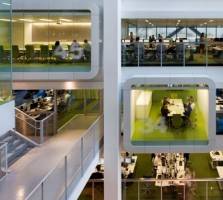April 21, 2016
Brexit referendum has not diminished demand for London office property 0
 Political uncertainty over the Brexit referendum has done little to diminish demand for London office property, despite it causing the commercial property market to experience a nervous start to the year. According to the latest research from Colliers, the number of vacant offices still remains low, with occupiers appearing to be relatively un-phased by external political and economic upheaval. There has been some high profile lettings and a healthy number of new large scale enquiries in the first quarter of this year – but transactions and searches have become protracted and supply shortages are undermining occupier expansion plans. However demand for office space amongst media and tech firms is diminishing in some locations. While Q1 2016 figures show that media and tech accounted for 38 percent of demand for office space across London, in the traditional media enclave of the West End, the figure fell to just 13 percent of demand, down from 45 percent in 2015.
Political uncertainty over the Brexit referendum has done little to diminish demand for London office property, despite it causing the commercial property market to experience a nervous start to the year. According to the latest research from Colliers, the number of vacant offices still remains low, with occupiers appearing to be relatively un-phased by external political and economic upheaval. There has been some high profile lettings and a healthy number of new large scale enquiries in the first quarter of this year – but transactions and searches have become protracted and supply shortages are undermining occupier expansion plans. However demand for office space amongst media and tech firms is diminishing in some locations. While Q1 2016 figures show that media and tech accounted for 38 percent of demand for office space across London, in the traditional media enclave of the West End, the figure fell to just 13 percent of demand, down from 45 percent in 2015.

































April 17, 2016
How can commuting to your choice of office affect staff productivity? 0
by Darren Bilsborough • Comment, Facilities management, Flexible working, Property
More →